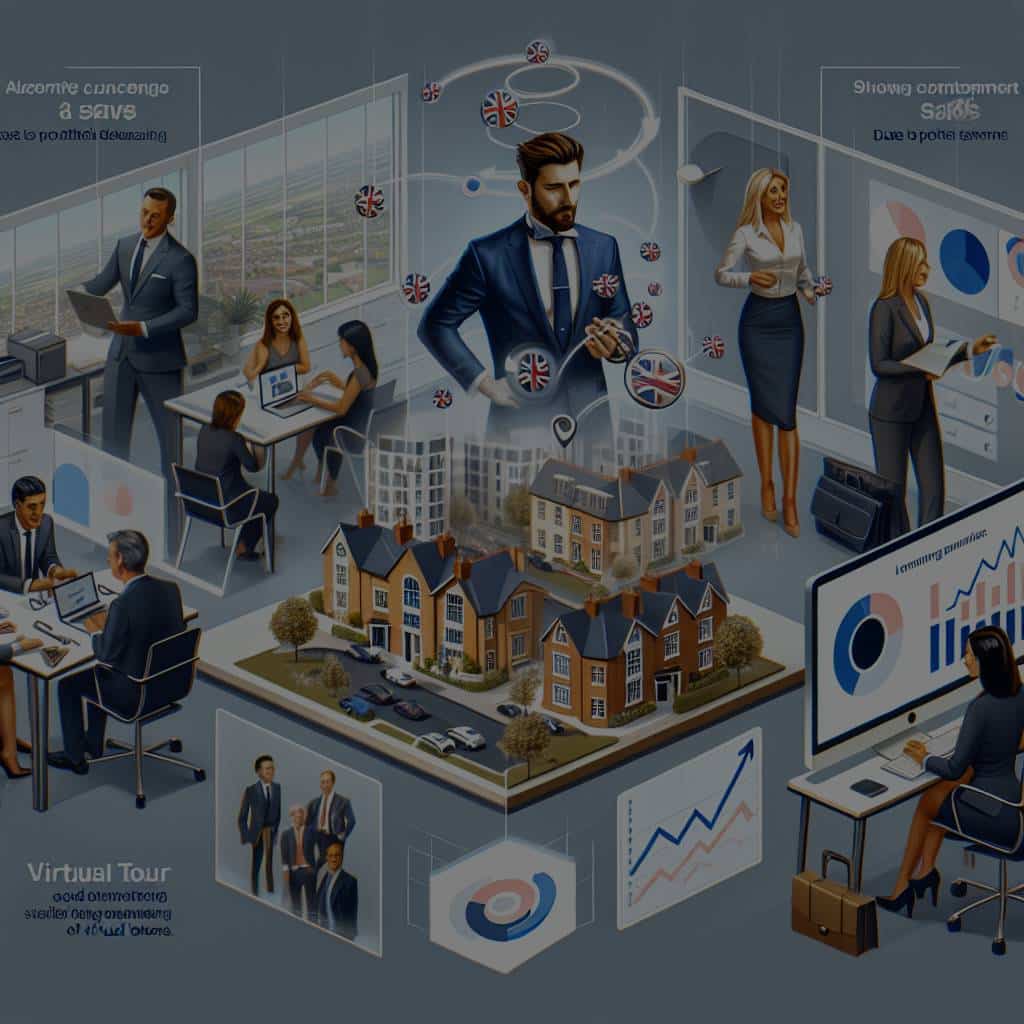How Can UK Real Estate Agencies Leverage Virtual Tours to Increase Sales?

Amidst the technological wave that has swept across industries, the real estate sector in the UK has not been left behind. Virtual tours have become a revolutionary tool in property marketing, providing an immersive and interactive experience for potential buyers. For real estate agencies, this digital approach can significantly boost sales, saving valuable time and resources. This article explores the use of virtual tours in real estate, offering insights on how agencies can leverage this technology to win over more clients and secure more sales.
Reinventing Property Showcases with Virtual Tours
Before the advent of digital technology, traditional property tours involved potential buyers and real estate agents taking time out of their busy schedules to visit properties. With virtual tours, this dynamic has changed drastically.
A lire en complément : What Are the Strategies for UK Restaurants to Overcome the Challenges of Food Delivery Apps?
Virtual tours allow prospective customers to explore every corner of a property at their convenience, from the comfort of their homes. Combining high-quality video content with 3D technology, these tours provide a 360-degree view of properties, capturing every detail from the floor patterns to the ceiling designs.
By adopting virtual tours, real estate agencies can showcase their properties to a wider audience, not just those in the immediate area. This opens up a wider market, increasing the chances of making a sale. Additionally, virtual tours provide an opportunity for real estate agencies to differentiate themselves in a competitive market, offering unique and engaging content that captures potential buyers’ attention.
Sujet a lire : What are the Key Factors in Selecting Sustainable Packaging Materials for UK Cosmetics Brands?
Enhancing Buyer Experience with Reality Simulation
Virtual tours are more than just a digital alternative to physical property viewings. They are an upgrade, offering buyers a more immersive and engaging experience.
Augmented reality, for instance, allows potential buyers to visualize how a house would look with different furniture arrangements or color schemes. By using virtual reality headsets, these potential buyers can walk through a property as if they were there, providing an experience that is as real as it gets without stepping foot in the house.
This capability to simulate reality improves the buyer’s decision-making process. Instead of relying on flat photos and descriptions, buyers can interact with the property, getting a feel for the space and its potential. This not only makes the buying process more enjoyable but also increases the chances of buyers committing to a purchase.
The Role of Virtual Tours in Real Estate Marketing
In the digital age, marketing strategies need to be innovative and adaptable. Virtual tours can be a valuable asset in a real estate agency’s marketing arsenal.
By incorporating virtual tours on their websites, agencies can keep visitors engaged for longer. This can lead to higher conversion rates, as visitors are more likely to make inquiries after a virtual tour. Furthermore, these tours can be easily shared on social media platforms, increasing the property’s visibility and reach.
Virtual tours also offer a unique way to capture leads. Agencies can require visitors to provide their contact information before accessing the tour, building a database of potential buyers. This can be invaluable for follow-up marketing campaigns.
Streamlining Property Sales Process with Virtual Tours
The real estate industry is often characterized by time-consuming processes, from property viewings to negotiations. However, virtual tours can help streamline these processes, making the sales cycle more efficient.
Virtual tours can save both the buyers and the agents a significant amount of time. Buyers can shortlist properties that truly interest them after taking the virtual tours, reducing the number of physical viewings. For agents, this means more focused viewings with serious buyers, increasing the chances of closing a sale.
Furthermore, virtual tours can also play a crucial role during negotiations. Buyers can refer back to the tours when discussing specific features of the property, clarifying any misunderstandings or ambiguities. This can lead to more productive conversations and quicker agreements.
Boosting Property Sales with Virtual Tours
Incorporating virtual tours into real estate operations is not just about keeping up with technology trends. It’s about recognizing the potential of these tours to transform property sales.
Virtual tours can make properties more appealing to potential buyers, presenting them in an engaging and interactive format. By offering a unique buyer experience, agencies can stand out in the highly competitive real estate market.
Moreover, virtual tours can support more efficient and effective sales processes. By attracting serious buyers and facilitating better communication, these tours can help agencies close sales faster. In the fast-paced world of real estate, this can make a significant difference in an agency’s bottom line.
In conclusion, embracing virtual tours can provide real estate agencies with a competitive edge, enhancing their marketing efforts, improving buyer experience, and ultimately driving sales. As technology continues to reshape the industry, agencies that leverage these digital tools may find themselves at the forefront of the real estate market.
Virtual Staging: A Game Changer in Real Estate Marketing
In the realm of real estate marketing, virtual staging has emerged as a game changer. This innovative approach uses virtual reality technology to furnish and decorate a property digitally, thus enhancing its appeal to potential buyers.
With virtual staging, empty or partially furnished properties can be virtually transformed into fully furnished, styled homes. This enables prospective buyers to visualize the potential of a property, which can be challenging when viewing an empty house. Unlike traditional staging, which can be expensive and time-consuming, virtual staging is cost-effective and quick, adding significant value to the property listings.
Moreover, virtual staging allows for customization according to the tastes and preferences of potential buyers. An estate agent can showcase different versions of the same property, catering to various aesthetic preferences. This level of personalization can significantly increase the property’s appeal, thereby boosting the chances of a sale.
In addition to enhancing property listings, virtual staging can also be used as a powerful tool in social media marketing. High-quality, virtually staged images can be shared across various platforms, attracting a wider audience and generating more interest in the property.
As such, integrating virtual staging into their marketing strategy can provide a significant advantage to estate professionals, allowing them to present their properties in the most attractive light and appeal to a broader range of buyers.
The Future of Real Estate: Embracing Virtual House Tours
The rise of virtual technology in the real estate industry is not just a passing trend. As more and more potential buyers become accustomed to the convenience and immersive experience of virtual house tours, the demand for this service is likely to increase.
Virtual house tours are more than just an innovative marketing tool. They represent a fundamental shift in the way properties are bought and sold, making the purchasing process more efficient, convenient, and enjoyable for all parties involved.
One significant advantage of virtual tours is their accessibility. Potential buyers can view properties from anywhere in the world, at any time, removing geographical barriers and expanding the market reach of estate agents. This can result in a broader pool of potential buyers, increasing competition and potentially driving up sale prices.
Furthermore, the interactive nature of virtual tours allows potential buyers to engage with the property on a deeper level. This can lead to a stronger emotional connection to the property, which is a key factor in the purchasing decision.
Finally, the use of virtual tours also demonstrates an estate agency’s commitment to leveraging the latest technology, which can enhance its reputation and credibility in the market.
In light of these benefits, it is clear that virtual house tours will continue to play a significant role in the real estate market in the future. Estate agents who embrace this technology and integrate it into their operations will be well-positioned to succeed in the increasingly digital and competitive real estate landscape.
Conclusion: The Digital Transformation of the UK Real Estate Industry
In conclusion, the adoption of virtual tours and associated technologies represents an exciting development in the UK real estate industry. By offering potential buyers an immersive, interactive, and convenient property viewing experience, estate agents can differentiate themselves in a highly competitive market, attract a wider audience, and increase the likelihood of sales.
Moreover, the incorporation of virtual staging into property listings can significantly enhance their appeal, enabling buyers to visualize the full potential of a property and connect with it on a deeper level.
As technology continues to evolve and shape consumer expectations, it is crucial for real estate agencies to stay ahead of the curve. Those that leverage the power of virtual tours, virtual reality, and social media marketing will be best placed to meet the demands of modern buyers and succeed in the fast-paced world of real estate.
Undoubtedly, the digital transformation of the real estate industry is here to stay. Virtual tours and other digital tools are not simply options to consider – they are essential components of a successful real estate strategy in today’s digital age. The question is no longer if real estate agencies should embrace these technologies, but how quickly and effectively they can do it.
